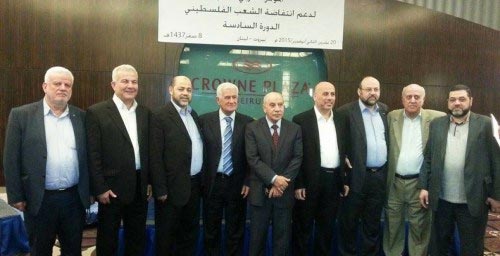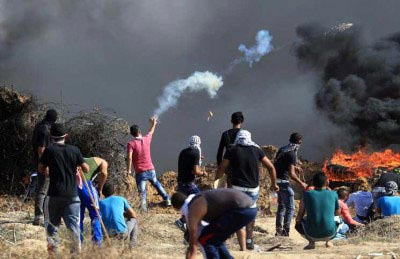The Palestinian leadership is attempting to portray the current intifada as a kind of popular, spontaneous struggle that expresses the population’s despair over the political situation. In reality, it is an intifada supported and directed by the Palestinian leadership in Ramallah (the Palestinian Authority-PLO-Fatah) and Gaza (Hamas).
It is a Palestinian strategy that has been seen before. The green light for violent agitation and terror attacks is given by the Palestinian leadership, and the message is translated into actions by field operatives of the Palestinian organizations or by Palestinian residents. The Palestinian leadership also guarantees a network of social and financial support to any Palestinian resident who is arrested, wounded or harmed in the course of anti-Israeli terror activity, including monthly stipends for the individual and his or her family.
The Palestinian intifada has clear goals. The Palestinian Authority, led by Mahmoud Abbas (Abu Mazen), wants to use it as a tool to achieve its political objectives, which include compelling Israel to withdraw from Judea, Samaria, and east Jerusalem under international pressure.
Abbas Zaki, a member of the Fatah Central Committee, took part in the General Arab Conference to Support the intifada that was held in Beirut on November 20, 2015. In his speech there he asserted that “the Palestinian revolution will only end with the collapse of the [Zionist] entity.”1
Hamas Political Bureau member Mousa Abu Marzook, in his speech at the gathering, said Palestinian unity was a key factor in the success of the intifada, which he described as a very effective instrument for achieving political objectives.2

Abu Marzook pointed out that the first intifada (which erupted in December 1987) led to the Oslo accords and the establishment of the Palestinian Authority. The second intifada in 2000 precipitated Israel’s withdrawal from Gaza and building of the security fence, which in his view, “despite its drawbacks, symbolizes the end of the Zionist endeavor.”
The goals of the current intifada (the Al-Quds intifada or Knives intifada), said Abu Marzook, are: forcing an Israeli withdrawal from Judea, Samaria, and Gaza, securing the freedom of all the Palestinian security prisoners, and lifting the blockade of Gaza.
Abu Marzook asserted that the intifada’s effectiveness depends on its continuation and expanding it in all spheres with all the Palestinian organizations participating. He urged the establishment of support committees for all aspects of the intifada.
The closing declaration of the Conference to Support the intifada, in which senior representatives of Fatah, which Abbas heads, took part, dubbed the current intifada the “Liberation intifada” and said it aimed to get Israel to withdraw from Judea and Samaria and dismantle the settlements.
In the closing declaration the participants stated that the intifada seeks to make it less costly for the IDF to withdraw from Jerusalem and the territories than to keep fighting both the intifada itself and international opinion. They said the Palestinians were already benefiting from the tension between Israel and the United States and Europe, which weakens Israel, the shift of public opinion against Israeli policy, and the strengthening of identification with the Palestinian people.3
The committee’s resolutions depict Israel as an enemy against which all-out war must be waged until its complete destruction. The first paragraph calls to put an end to the intra-Palestinian rift and for pursuing a national liberation program that is based on the intifada and the struggle to “liberate all the occupied land.” The second paragraph calls to implement the March 2015 resolutions of the PLO Central Committee, which called for ending security cooperation with Israel and investing all efforts in building the intifada and waging the struggle based on the goals and legitimate rights of the Palestinian people, while also canceling the agreements with Israel.
* * *
Notes
1 http://www.noqta.info/page-91045-ar.html
2 http://www.noqta.info/page-91041-ar.html
3 http://www.alwatanvoice.com/arabic/news/2015/11/25/819989.html – See more at: http://jcpa.org/the-popular-spontaneous-intifada-is-organized-and-orchestrated-by-the-palestinian-leadership/#sthash.Bgg9Y2mc.dpuf









